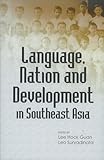Language, Nation and Development in Southeast Asia / ed. by Hock Guan Lee, Leo Suryadinata.
Material type: TextPublisher: Singapore : ISEAS Publishing, [2007]Copyright date: ©2007Description: 1 online resource (248 p.)Content type:
TextPublisher: Singapore : ISEAS Publishing, [2007]Copyright date: ©2007Description: 1 online resource (248 p.)Content type: - 9789812304827
- 9789812304834
- 305.8
- P119.32.S64 L34 2007
- P119.32.S64 L34 2007
- online - DeGruyter
| Item type | Current library | Call number | URL | Status | Notes | Barcode | |
|---|---|---|---|---|---|---|---|
 eBook
eBook
|
Biblioteca "Angelicum" Pont. Univ. S.Tommaso d'Aquino Nuvola online | online - DeGruyter (Browse shelf(Opens below)) | Online access | Not for loan (Accesso limitato) | Accesso per gli utenti autorizzati / Access for authorized users | (dgr)9789812304834 |
Frontmatter -- Contents -- Preface -- The Contributors -- Keynote Address -- Introduction -- 1 Language, Nation and Development in the Philippines -- 2 Go Back to Class: The Medium of Instruction Debate in the Philippines -- 3 National Language and Nation-Building: The Case of Bahasa Indonesia -- 4 Diverse Voices: Indonesian Literature and Nation-Building -- 5 The Multilingual State in Search of the Nation: The Language Policy and Discourse in Singapore’s Nation-Building -- 6 Ethnic Politics, National Development and Language Policy in Malaysia -- 7 The Politics of Language Policy in Myanmar: Imagining Togetherness, Practising Difference? -- 8 The Positions of Non-Thai Languages in Thailand -- 9 Vietnamese Language and Media Policy in the Service of Deterritorialized Nation-Building -- Index
restricted access online access with authorization star
http://purl.org/coar/access_right/c_16ec
Language policies in Southeast Asia have been shaped by the process of nation-building on the one hand and by political and economic considerations on the other. The early years of nation-building in Southeast Asia generated intensive language conflicts precisely because state policies privileged the idea of a monolingual nation and thus endeavoured to co-opt or even do away with troublesome ethnic identities. In recent years, language policies are increasingly influenced by pragmatic considerations, especially globalization and the awareness of a linkage between language and economic development, such that Southeast Asian states in varying degrees have become less insistent on promoting monolingual nationalism. This book evaluates the successes and drawbacks of language policies in Indonesia, Malaysia, Singapore, the Philippines, Thailand, Vietnam and Myanmar, especially the ways in which these policies have often been resisted or contested. It is an invaluable primer on this linguistically complex region and a resource for scholars, policy-makers, civil society activists and NGOs in various parts of the world facing equally challenging ethnic/language issues.
Mode of access: Internet via World Wide Web.
In English.
Description based on online resource; title from PDF title page (publisher's Web site, viewed 01. Dez 2022)


